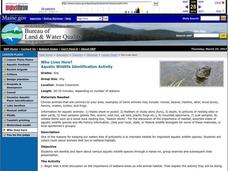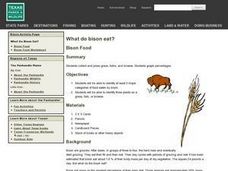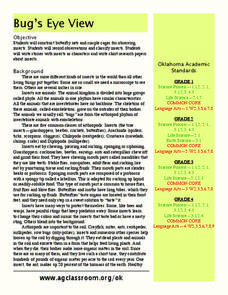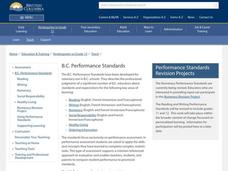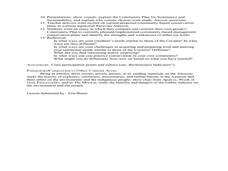Curated OER
Sometimes and All the Time Foods
Students recognize a wide variety of fruit and have a greater understanding about the importance of fruit in their diet, and determine that some fruits' skins are edible and others are not.
Curated OER
Who Lives Here?
Students identify various aquatic wildlife species. In this biology lesson students collect clues about animals that live in wetland habitats. Students rotate through several stations displaying particular animal species to collect their...
Curated OER
What do Bison Eat?
Students identify the three major categories of food eaten by bison. In groups, they collect examples of grass and forbs and press them. They complete a chart of the percentages of each type of food the bison eat in a day. They...
Curated OER
So You Think You're Tough
Fourth graders learn how to classify animals. In this invertebrates lesson, 4th graders discuss how we classify thinks into groups and move into a discussion about classifying animals. Students learn about the differences between...
Curated OER
What Animals Need to Live
Fourth graders read "Habitat: What Animals Need to Live" then create a Venn diagram for herbivore, omnivore, and carnivore. In this animal survival lesson, 4th graders determine where different animals need to live depending on what they...
Curated OER
Explore: Third Grade Scents
Students use the olfactory sense to determine if a marker is appropriate 'food' or not. This experience helps students explain why so many animals rely on the sense of smell to find prey.
Curated OER
Animal Alphabet
Second graders identify animals with each letter of the alphabet. In groups, they create a PowerPoint presentation which shows the information they have collected about each one. Using all of this information, they create an animal...
Curated OER
Mosquito Life Cycles
Students gather mosquito eggs to record the mosquito life cycle using drawings, descriptions, and any other appropriate means. In small groups, they analyze and describe the process of complete metamorphosis. They classify mosquitoes...
Curated OER
Natural Selection
Students model natural selection by using various utensils to "capture food" using a simulated species called "Woolybooger's."
Curated OER
Tree-Mendous!
Students classify trees. In this tree-mendous lesson, students categorize a variety of trees to assist them in playing a Jeopardy like game. Students identify new vocabulary terms and classify the uses and benefits of trees for humans.
Curated OER
Social Studies: Food and Dining in Cameroon
Pupils review their findings on Cameroon and play a vocabulary game. Using provided recipe packets, they present a mock cooking show with a student narrating in French. They role-play as exchange students and write letters home about the...
Curated OER
Living and Non-Living
Fourth graders are divided into small groups and collect 4 objects from the playground. They take 5 to 10 minutes to classify their groups and discuss their findings including the terms "living" and "non-living". As a class they discuss...
Curated OER
Diversity And Adaptations Of Organisms
Eighth graders study how and why animals are classified into eight groups in the animal kingdom. They work together to identify organisms. They use the key to determine the phylum for the included problems.
Curated OER
Exploring Limu Diversity
Students explore limu diversity. In this ocean ecosystem lesson, students classify limu according to its physical properties. Students work in small groups to generate scientific observations and sort limu by characteristics.
Curated OER
Field Trip!: A Visit to the Grocery Store
Students discover that foods are organized into groups of similar items by developing vocabulary to enhance verbal discussion i.e., real experiences provide the foundation for thoughtful discussion and critical thinking. They then...
Curated OER
Bug's Eye View
Learners explore biology by writing fictitious stories in class. In this insect life lesson, students identify many different types of insects in the animal kingdom and the classifications they fall into. Learners collect insects on a...
Curated OER
Introduction To Natural Selection
Seventh graders investigate the concept of natural selection and it relation to the theory of evolution. They create a definition for classification based upon looking at other subjects that are similar. The variation of species is...
Curated OER
Childhood Obesity
Students identify a question to generate appropriate data and predict results. They distinguish between a total population and a sample and use a variety of methods to collect and record data. Students create classifications and ranges...
Curated OER
Fracture Fundamentals: A Cheesy Analog
Learners make small cuts (fracture nuclei) in processed cheese food and then apply stresses perpendicular or parallel to the cuts to see how fractures grow. They make predictions before each experiment and explain their results to the...
Curated OER
Supermarkets, Sustenance and Sustainability
Students investigate jungles and the people who depend upon them. In this sustainability lesson plan, students research wild life conservation and discover the importance of a jungle to Amazonian people. Students create a group...
Curated OER
The Three Worm Phyla
Ninth graders examine the three worm phyla. For this classification lesson, 9th graders observe, compare and contrast the planarian, tapeworm, and fluke.
Curated OER
The Solar System: Why do we Explore?
Third graders act as scientists. In this property discovery lesson, 3rd graders explore the substance "Oobleck" (cornstarch, water, food coloring). They work in groups to investigate the substance and make observations as a scientist...
Curated OER
Peter Rabbit Meets Charles Darwin
Learners start to think of evolution in terms of populations. The class follows a cartoon scenario of a rabbit population in which there is selection and change of gene frequency. They receive copies of the scenario or the whole thing...
Curated OER
Repopulating Michigan's Waterways
Eleventh graders identify the parts of an ecosystem and how communities change over time. For this ecology lesson students formulate a habitat restoration plan.



